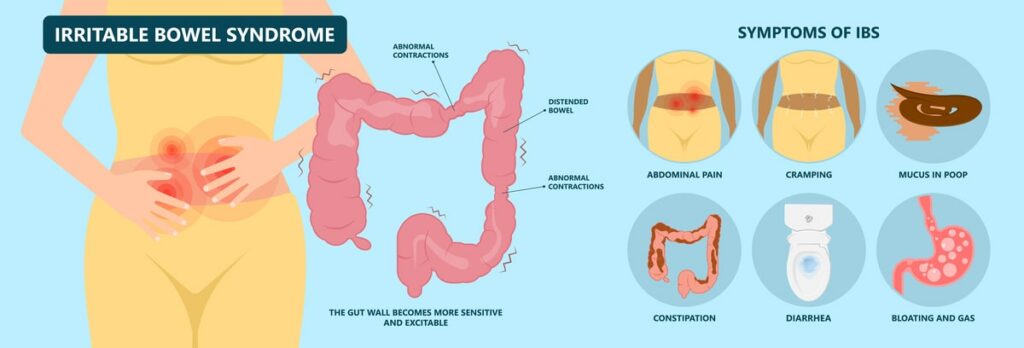
IBS is one of the most diagnosed digestive conditions, with a global prevalence of 10-20%. However, cases in the general population are towards the higher end of this scale in westernised cultures. IBS is also nearly twice as common in women as in men. [Source: Pubmed]
This diagnosis of IBS is based on meeting the symptoms outlined in the ROME criteria. This indicates that to be diagnosed with IBS, an individual needs to experience abdominal pain changes in bowel patterns.
There also needs to be the absence of any other diagnosed digestive disease. For example, there should be no indication of conditions such as inflammatory bowel disease (IBD) or coeliac disease [Source: Pubmed].
Although the noises that the stomach can generate are not within the criteria for an IBS diagnosis, they are often also present with other IBS symptoms.
What causes IBS?
While the cause of IBS isn’t exactly known and likely varies from person to person, there are several risk factors associated with the development of IBS. While these risk factors do not guarantee that someone will develop the symptoms of IBS or an increase in stomach noises, it does increase the chances.
These risk factors include:
- Long term dietary patterns (a low fibre diet)
- Food poisoning
- Travellers diarrhoea
- Medications
- Anxiety
- Adverse childhood experiences [Source: Pubmed].
These occurrences can result in changes within the digestive system as well as altered signalling between the gut and the brain. Researchers have identified particular alterations in the gut which include:
- Alterations in motility (leading to constipation or diarrhoea)
- Visceral sensation (increases sensitivity of the gut lining)
- Brain–gut interactions
- Microbiome changes (gut bacteria imbalances)
- Bile acid metabolism
- Intestinal permeability (leaky gut)
- Low-grade inflammation [Source: Pubmed]
What are the symptoms of IBS?

The symptoms of IBS are primarily based on the change in function within the digestive tract.
This is where symptoms such as bloating, distention, changes in bowel patterns as well as abdominal pain may all contribute to the clinical presentation.
While not within the ROME criteria, patients often also report symptoms such as brain fog, anxiety, and insomnia [Source: Pubmed, Pubmed]. Stomach sounds are also seen in higher amounts in those with IBS [Source: Pubmed].
Also Read: How To Cure IBS Permanently
IBS and Stomach Noises
The technical name for the tummy rumbling or gurgling sounds that can occur is borborygmi. While the exact causes of the stomach rumbling sounds aren’t precisely known, it’s understood to be a combination of factors that include:
- The muscles in the digestive system contracting
- The gas within the digestive system
- The liquid within the digestive system [Source: IFFGD]
In IBS, these sounds may be louder and more severe. One study found that gas production within the gut as well as visceral hypersensitivity contribute to symptoms including bloating and borborygmi. The severity of the stomach sounds was directly related to the amount of gas being produced in the gut. [Source: Pubmed]
These stomach sounds are also commonly reported in those with lactose intolerance. Lactose intolerance presents with the same range of symptoms as IBS, and symptoms depend on several factors.
- The amount of the lactose degrading enzyme in the digestive system
- The dose of lactose
- The balance of the gut microbiome
- Gastrointestinal motility
- SIBO (small intestinal bacterial overgrowth)
- Visceral hypersensitivity [Source: Pubmed]
These changes generally lead to undigested lactose arriving at the large intestine, where it is then fermented. This can result in an increase in gas and a change in muscular contractions.
This higher level of stomach noises here can be described as hyperactive bowel sounds. [Source: IFFGD]
Are stomach sounds normal?
Stomach sounds are very normal in the general population. These are either the result of digestion or via a second mechanism known as the migrating motor complex (MMC).
The role of the MMC is not fully understood, but it is believed to be related to acting as a ‘housekeeper’ for the small bowel.
The muscular contractions of the MMC can help to push any debris from the digestive process down towards the large bowel, as well as help regulate the microbial balance of the small intestine [Source: Pubmed].
This is a recurring pattern of muscular contractions that occurs in the stomach and small intestine during fasting. However, once food enters the digestive system, the MMC is interrupted.
The sounds associated with the MMC may be associated with the stomach rumbling due to hunger. As the MMC is only active in the fasted state, if the sounds originating from the digestive system occur ahead of eating, it’s likely due to the MMC [Source: Pubmed].
IBS Treatments
The treatment for IBS is largely dependent on the underlying reasons behind the symptoms. These underlying reasons are often referred to as root causes.
As already mentioned, dietary triggers, such as lactose, maybe the main factor leading to a worsening in symptoms. However, even with lactose intolerance, the question can then be asked, ‘what is causing the lactose intolerance?’
For some, this may be a genetic issue with producing the enzyme required to digest lactose. For others, lactose intolerance may have developed following food poisoning. Food poisoning has been associated with bacteria changes in the small bowel as well as a chronic low-grade inflammatory response in the gut lining. [Source: Research Gate]
Probiotic supplements are also a key tool to consider during treatment for IBS. A variety of specific strains have been indicated to improve the overall symptoms of IBS. This includes the normalisation of bowel patterns and addressing symptoms such as bloating and distention, as well as cramping. [Source: Pubmed]
In the case of SIBO, herbal antimicrobial herbs can also be considered to support a balanced microbial ecosystem leading to an improvement in IBS symptoms [Source: Pubmed].
Understanding Digestion
Digestion is the biological process that allows the human body to break down and absorb nutrients from the digestive tract into the bloodstream.
There are 2 key elements of the digestive process which include the mechanical action of digestion and the chemical. The mechanical action of digestion is the process of chewing that takes place in the mouth. This breaks down the food to increase its surface area which allows the chemical aspect of digestion to work more efficiently.
The chemical action of digestion is carried out by digestive enzymes. There are various digestive enzymes that support the digestion of the different macronutrients (protein, fat and carbohydrate). This helps to break the food that we eat into molecules that are more easily absorbed from the digestive tract and into the bloodstream [Source: Pubmed]
Within food, there are also compounds that humans cannot digest. These compounds are dietary fibres which serve 2 main roles within the digestive processes. Firstly, insoluble fibre acts to provide bulk to the stool which can help with bowel movements. Secondly, the soluble fibres are fermented when they reach the large intestine and act as prebiotics that supports the gut microbiome. [Source: Pubmed]
IBS Diets

A low FODMAP diet is a key tool that can be used to support symptoms of IBS. This dietary approach removes specific dietary carbohydrates (sugars and fibres), which may lead to an increase in gas production. Therefore, by limiting these carbohydrates, the aim is to manage symptoms. [Source: Pubmed]
This can be an extremely helpful approach for those with severe digestive discomfort. However, it should only be used in the short term as a tool to manage symptoms, as long-term FODMAP restriction has been shown to impact the health of the gut microbiome [Source: Pubmed].
This reinforces the need for a low FODMAP diet to be used as a tool to help manage symptoms while the underlying issues are addressed. Following this, the aim would be to gradually reintroduce the FODMAP-containing foods. This process may best be carried out with the support of a practitioner specialising in gut health.
How Do You Stop Stomach Noises With IBS
The central way to stop the stomach noises in IBS is to address the underlying issue in the gut.
As mentioned, this included factors such as:
- Long term dietary patterns
- Food poisoning
- Travellers’ diarrhoea
- Medications
- Anxiety
- Adverse childhood experiences [Source: Pubmed]
This means that depending on the underlying issue, there may be differences in how to address stomach noises in IBS. However, there are central and foundational ways to support digestive health that can be helpful in most cases of IBS.
Chewing is one of the only aspects of digestion we have control over. Once we swallow the food the body takes over automatically to carry out the next stages of digestion. This means that focusing on chewing is key for healthy digestion. A 2018 study examined chewing and its role in digestion and concluded that insufficient chewing led to an increase in IBS symptoms. [Source: Pubmed]
Dental health is related to how well we can chew our food. In the same study, it was reported that tooth loss was a risk factor for digestive issues. This is likely due to its impact on how we can chew. [Source: Pubmed]
Probiotics have been shown to help with a wide range of digestive issues. There is increasing research into the most appropriate types of probiotic bacteria to use for IBS symptoms. Some probiotics have been indicated to be more beneficial for symptoms of bloating while others may be more helpful for IBS symptoms of diarrhoea. [Source: Pubmed, Pubmed]
Avoiding trigger foods is a common recommendation but many people are unaware of what their trigger foods are. This is one reason why a short-term trial of a low FODMAP diet may be helpful to identify triggers.
Also Read: Low FODMAP Foods – Everything You Need To Know
Medicinal herbs have been shown to improve a wide range of IBS symptoms such as noise and pain. These can be included in the form of herbal teas or also as supplements in capsules. Herbs that have been reported to improve symptoms of IBS include caraway, peppermint and ginger [Source: Pubmed, Pubmed, Pubmed]
Abdominal massage (stomach massage) has been studied in and reported to improve to the IBS symptom of constipation. Since stomach noises can be the result of constipation this can be an additional area to include to support healthy digestion and appropriate peristalsis [Source: Pubmed]
Conclusion
Stomach sounds are a normal part of digestive health. However, in the healthy population, they may be more common ahead of eating than after eating.
Additionally, if the sounds (potentially classified as hyperactive bowel sounds) are associated with IBS symptoms such as bloating, cramping, and the urgent need for a bowel movement, this is likely due to the underlying imbalances in the digestive system.
As will all digestive symptoms, uncovering the underlying reason for your symptoms is an integral part of the process of resolving your symptoms.
Frequently Asked Questions:
What Triggers an IBS Flare-Up?
There are many factors that can trigger a flare-up in IBS symptoms. These can include certain foods such as spicy and fatty foods, stress or a bad night’s sleep as well as certain medications such as antibiotics.
Some with IBS also find that IBS has flared up following an event of food poisoning or viral gastroenteritis. In some cases this flare-up can calm down by itself, in others symptoms may continue and require support.
What Drinks to Avoid With IBS?
There are several drinks that can increase IBS symptoms or contribute to a flare-up. The most commonly reported drinks that increase symptoms of IBS are caffeine-containing drinks (tea, coffee, fizzy drinks), alcohol as well as lactose-containing drinks such as milk.
There are also other drinks that may increase symptoms such as fruit juices and chamomile tea. This is due to their FODMAP content which some IBS patients may not be able to tolerate.






